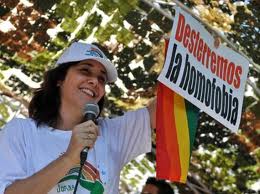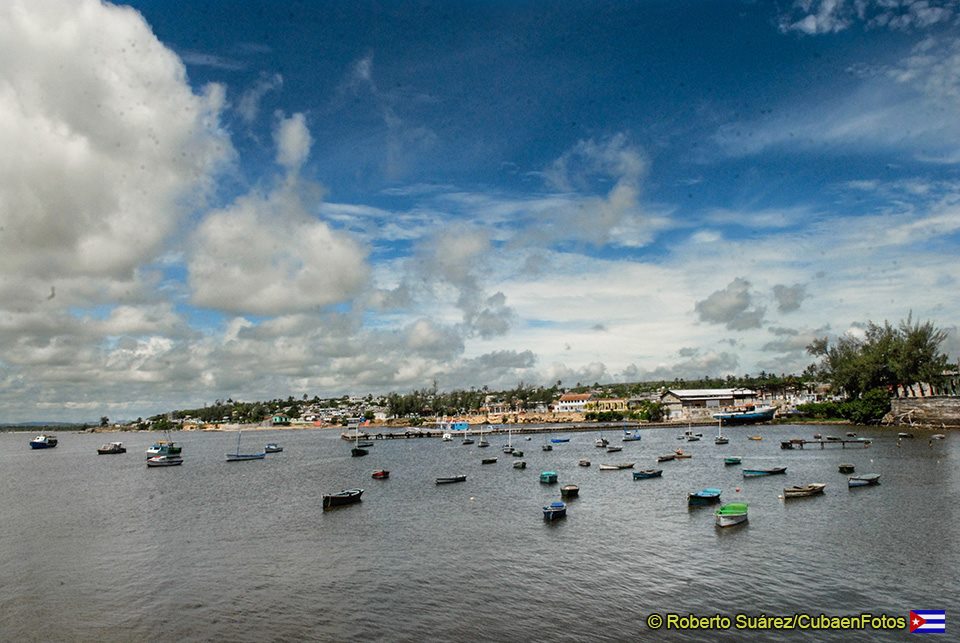 EL HOMOSEXUALISMO EN CUBA, UNA VISIÓN GUBERNAMENTAL.
EL HOMOSEXUALISMO EN CUBA, UNA VISIÓN GUBERNAMENTAL.
por Yuris Nórido.
Periodista de el diario “Trabajadores” y el sitio digital CubaSí. Es miembro del Partido Comunista de Cuba (PCC).
En Cuba se han producido importantes avances en materia de derechos LGBT.
Ya no es tan complicado asumirse homosexual en Cuba. Obviamente, persisten prejuicios, limitaciones, incomprensiones. Pero la sociedad se muestra más abierta, o por lo menos más tolerante ante la diversidad de orientaciones sexuales.
Y está claro: no debe haber pasos atrás.
En los últimos años hemos sido testigos de evidentes avances en ese sentido.
Los tiempos en los que se recluía a homosexuales y religiosos en campamentos de trabajo llamados UMAP (Unidades Militares de Apoyo a la Producción) con la intención más o menos explícita de “reeducarlos”, son hace mucho tiempo historia.
La política cultural, que en determinado momento discriminó y castigó a los homosexuales (el Congreso de Educación y Cultura de 1971 consideró que la homosexualidad era un rezago de la sociedad capitalista), reconoce y promueve ahora la obra de creadores independientemente de sus preferencias sexuales.
Ya no hay “parametraciones” (cazas de brujas, recuerdan algunas víctimas) en el arte y la literatura, en ninguna actividad social.
Por primera vez, el Parlamento aprobó una ley —el Código de Trabajo— que prohíbe la discriminación por orientación sexual.
El Partido Comunista de Cuba explicitó en sus Lineamientos su rechazo a toda forma de segregación por esas cuestiones.
Los homosexuales ganan cada vez más espacios en el ámbito público, sobre todo en las principales ciudades.
Con todo lo dicho, podría parecer que el panorama es idílico, pero está muy lejos de serlo.
Es cierto, la militante homofobia institucional de hace décadas parece en buena medida superada, pero los homosexuales (hombres y mujeres), los transexuales y transgéneros tienen todavía un gran pliego de demandas, de derechos no reconocidos.
Y tienen que enfrentar las reservas de algunos sectores de poder reacios a promover reformas.
Hace poco, en el Parlamento, durante la discusión del Código de Trabajo, la diputada Mariela Castro votó en contra de la aprobación de la Ley por considerar que no protegía a los transexuales ni a los seropositivos.
Varios activistas por los derechos LGBT han apoyado a la también directora del Centro Nacional de Educación Sexual (Cenesex) con una reclamación legal que cuestiona algunos de los métodos de trabajo del Parlamento.
Algunos activistas y grupos han sugerido incluso que Mariela Castro asuma su derecho a la iniciativa legislativa, para que promueva la discusión y aprobación de un nuevo Código de Familia, que reconozca derechos inalienables de las personas LGBT.
Matrimonio igualitario, posibilidad de adoptar, piden algunos.
Otros —la propia Mariela— son más cautos: hablan de uniones civiles, de acciones educativas e igualdad de oportunidades.
Hasta el momento, el Parlamento ha callado. Los debates sobre ese tema no tienen fecha. Y el gobierno y el Partido Comunista no han impulsado la necesaria reforma de la ley.
El movimiento civil es todavía incipiente, pero ya se hace sentir.
Aunque, hay que decirlo, una parte importante de la ciudadanía no está familiarizada con la batalla. Asumen que no es un tema vital.
A pesar de que todavía persisten algunos prejuicios, asumirse homosexual en Cuba ya no es tan complicado.
En realidad cuando se le niega un derecho a un grupo de personas, a la larga se les está negando a todos. Por eso no hay temas menores.
Algunos activistas consideran que el Cenesex —que es una institución gubernamental— no debería asumir y mucho menos liderar la lucha por el absoluto reconocimiento de los derechos LGBT, que de eso tendrían que ocuparse organizaciones no gubernamentales.
Otros creen que ninguna ONG tiene el poder de convocatoria y las herramientas metodológicas del Cenesex.
Lo cierto es que más allá de las jornadas contra la homofobia (con galas artísticas, conferencias y marchas por céntricas calles), a las que suelen asistir altos cargos del gobierno, no se ha logrado un compromiso claro de los entes decisores.
La reforma de la ley se impone, pero no parece ser una prioridad. O quizás no haya consensos en altas instancias.
Los activistas, de cualquier forma, no se dan por vencidos. Cuba estuvo a la cabeza de América Latina en legislaciones en defensa de los derechos de las mujeres. Pero en el tema de los homosexuales, vamos mucho más lento que otros países de la región.
Por supuesto que una ley no resolvería todos los problemas de la comunidad LGTB en Cuba (si es que puede hablarse de comunidad, algunos prefieren hablar de colectivo, o sencillamente, de grupo o sector). Pero sentaría referentes.
Las fuerzas del orden (la Policía Nacional Revolucionaria) tienen todavía por delante el reto de educar a todos sus efectivos en el respeto a la diferencia.
Ser homosexual no es un delito y tampoco un agravante de cualquier delito.
En los centros de dirección parecen tenerlo claro, pero algunos miembros del cuerpo —sobre todo en la base: vigilantes, patrulleros— evidencian sus prejuicios en la labor cotidiana.
Aunque muchos cubanos no están familiarizados con el tema, el movimiento civil ya se hace sentir.
Falta también un tratamiento equilibrado del tema en los medios de comunicación, que suelen ignorarlo o minimizarlo.
En última instancia, lo abordan en las páginas o espacios de salud y sexualidad, desconociendo muchas aristas sociales.
No pretendemos agotar el tema, queda mucho en el tintero.
La Habana y otras ciudades ya tienen una animada vida nocturna gay, con cabarets, discotecas, lugares de encuentro, fiestas temáticas… Y son perfectamente legales.
Puede ser un tema para otras entregas, pues hay matices y puntos de conflictos.
Es posible (casi seguro) que haya puntuales manifestaciones y crímenes de odio (no se divulgan estadísticas en ese sentido), pero en Cuba no son frecuentes grandes golpizas ni mucho menos asesinatos a homosexuales por el simple hecho de asumir su orientación sexual.
Queda mucho trabajo por hacer, y es una responsabilidad de todos: las autoridades, los educadores, los activistas, las familias…
Tenemos que aspirar a una sociedad mucho más inclusiva.
Pero poco a poco se va ganando en comprensión y en tolerancia.
Claro, para muchos —los más afectados— “poco a poco” no puede ser una opción aceptable.
BBCMundo, La Habana/InternetPhotos/www.thecubanhistory.com
The Cuban History, Hollywood.
Arnoldo Varona, Editor.
HOMOSEXUALITY IN CUBA, A VIEW FROM THE GOVERNMENT SIDE.
by Yuris Nórido.
Journalist of the newspaper “Trabajadores” (Workers) and digital site CubaSí. Member of the Communist Party of Cuba (PCC).
In Cuba there have been significant advances in LGBT rights.
It’s not as complicated assumed homosexual in Cuba. Obviously, there are still prejudices, limitations, misunderstandings. But society is more open, or at least more tolerant of diverse sexual orientations.
And it is clear: there shouldn’t be steps going back.
In recent years we have witnessed clear progress in this direction.
The times in which homosexuals and religious were detained in labor camps called UMAP (Military Units to Aid Production) with more or less explicit intention to “reeducate” are long history.
Cultural policy, which discriminated at some point and punished homosexuals (Congress of Education and Culture 1971 homosexuality was considered a lag of capitalist society) now recognizes and promotes the work of artists regardless of their sexual preferences.
There is no “parametraciones” (witch hunts, remember some victims) in art and literature, in any social activity.
For the first time, Parliament passed a law-the Code of Work-prohibiting discrimination based on sexual orientation.
The Communist Party of Cuba explicit in its Guidelines its rejection of all forms of segregation in these issues.
Homosexuals are gaining spaces in the public sphere, especially in major cities.
With all that said, it might seem that the picture is idyllic, but is far from it.
True, the institutional homophobia militant decades surpassed seems good measure, but homosexuals (men and women), transsexuals and transgenders still have a big list of demands, unrecognized rights.
And have to face the reservations of some sectors reluctant to promote reforms.
Recently in Parliament during the discussion of the Labour Code, the deputy Mariela Castro voted against the adoption of the Act on the grounds that it did not protect transgender and HIV-positive.
Several LGBT rights activists have also supported the Director, National Center for Sex Education (Cenesex) with a legal claim into question some of the methods of work of the Parliament.
Some activists and groups have even suggested that Mariela Castro assume its right of legislative initiative to encourage discussion and adoption of a new Family Code, which recognizes the inalienable rights of LGBT people.
Equal marriage, possibility of adopting, ask some.
Other own-the Mariela- are more cautious: civil unions, educational activities and equal opportunities speak.
So far, Parliament has silent. Discussions on this issue are not dated. And the government and the Communist Party have not driven the need to reform the law.
The civil rights movement is still in its infancy, but is already being felt.
Although it must be said, an important part of citizenship is not familiar with the battle. Assume it is not a vital issue.
Although there are still some prejudices, assumed homosexual in Cuba is not so complicated.
Actually when you are denied a right to a group of people, eventually being denied to all. So there is no minor issues.
Some activists believe the Cenesex which is a relevant government agency should not assume much less lead the struggle for full recognition of LGBT rights, that would have to deal NGOs.
Others believe that no NGO has the power to call and methodological tools Cenesex.
The truth is that beyond the conference against homophobia (with artistic galas, conferences and marches through downtown streets), which usually attend senior government, has not made a clear commitment of decision makers entities.
The reform of the law is imposed, but does not seem to be a priority. Or maybe there is no consensus in high places.
The activists, in any way, do not give up. Cuba was the top Latin American law in defense of the rights of women. But on the issue of homosexuals, let much slower than other countries in the region.
Of course a law would not solve all the problems of the LGBT community in Cuba (if one can speak of community, some prefer to speak of collective, or simply, group or sector). But sit referents.
Law enforcement agencies (the National Revolutionary Police) still have to face the challenge of educating all its troops on respect for difference.
Being homosexual is not a crime nor an aggravation of any offense.
In centers seem to have clear direction, but some members of the body, especially in the base: vigilantes, patrulleros- show their prejudices in everyday work.
Although many Cubans are not familiar with the topic, civil movement and felt.
Also lack a balanced treatment of the subject in the media, which tend to ignore or minimize.
Ultimately, as discussed in the pages or areas of health and sexuality, ignoring many social edges.
We do not pretend to exhaust the subject, much more in the pipeline.
Havana and other cities already have a vibrant gay nightlife, with cabarets, clubs, venues, theme parties … and are perfectly legal.
It may be an issue for other deliveries as there are nuances and points of conflict.
It is possible (almost certain) you have specific manifestations and hate crimes (no statistics are reported in that sense), but in Cuba are not frequent beatings far larger murders homosexuals simply by assuming their sexual orientation.
Everyone’s responsibility is much work to be done, and the authorities, educators, activists, families …
We must aspire to a more inclusive society.
But gradually it is gaining in understanding and tolerance.
Of course, for many “little by little” can not be an acceptable option.
BBCMundo, Havana / InternetPhotos / www.thecubanhistory.com
The Cuban History, Hollywood.
Arnoldo Varona, Editor.



 HOMOSEXUALITY in Cuba, view from the government side. * * EL HOMOSEXUALISMO en Cuba, una visión gubernamental.
HOMOSEXUALITY in Cuba, view from the government side. * * EL HOMOSEXUALISMO en Cuba, una visión gubernamental.




